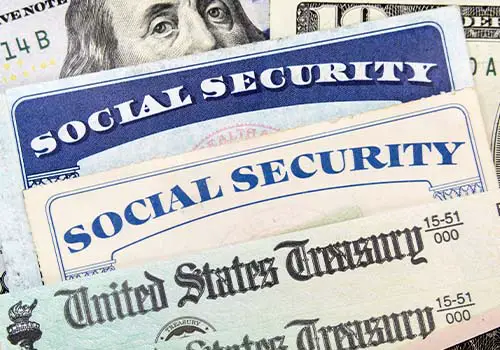The Social Security Administration makes millions of monthly benefit payments, and the Social Security program is the largest item in the Federal budget each year. Beneficiaries receive many different types of benefits, including retirement benefits, disability benefits, and SSI benefits.
You likely already know that you generally become eligible for Social Security benefits at age 62. However, your payments will increase if you wait until the full retirement age to start the benefits. However, what happens to unused Social Security benefits? For example, suppose someone entitled to retirement benefits passes away at age 60 and never receives a benefit payment.
What happens to the Social Security payments that they would have gotten? The answer depends on a few factors, such as the type of benefits in question and the status of family members who might be entitled to benefits. Keep reading as we give you all the details about what happens when benefits go unused.
How Unused Social Security Benefits Are Handled
Unused Social Security benefits remain in the Social Security trust funds for payments to other Social Security benefit recipients. This rule applies to all types of Social Security benefits, including Social Security retirement benefits and Social Security disability benefits.
Remember that the Social Security Administration (SSA) does not hold your Social Security benefits in a private account. Instead, all Social Security taxes from current workers go into the trust funds to be used as payments to current benefit recipients. We will discuss more in the next section about how Social Security works.
Your family members might sometimes be entitled to survivor benefits based on your work record. While this is not technically a refund of unused benefits, it does provide a spouse, child, or even parents some level of benefits after the death of a Social Security recipient. We will also discuss the survivor benefit rules later in this article, detailing who can qualify for them and how much they can get.
KEY TAKEAWAYS
- No “unused” Social Security benefits exist since all OASDI taxes are placed into a general trust fund, and benefits are not guaranteed.
- Individuals with sufficient work credits, disabled individuals, spouses, ex-spouses, widows, and children may all be eligible for Social Security benefits under various circumstances.
- Social Security benefits end upon your death; they cannot be transferred or inherited, but surviving family members may be eligible for “survivor” benefits.
How Social Security Benefits Work
Understanding how Social Security benefits work helps explain why unused benefits remain in the trust funds. The specifics are a little different depending on which type of benefit is in question, so we’ll discuss the various types separately.
Social Security Retirement Benefits
Most retirees rely on their monthly benefit payments, but many do not know how these benefits work. You have likely seen the Social Security tax withheld from your paycheck each month. You might think this amount is going into an account dedicated to your retirement. However, that is not the case at all. The Social Security tax is also known as the OASDI or Old Age Survivors and Disability Insurance tax. All Americans must pay this tax on earned income (even those who are self-employed), and very few exceptions exist. The collected tax is placed into the Social Security trust funds, not an individual retirement account.
Work Requirements
Taxes collected today pay the benefit amounts for today’s Social Security recipients. To qualify for retirement benefits, you must have a sufficient work record. You must have contributed a minimum quantity to the system to be eligible for benefits. Typically, you must have worked full-time for at least ten years. The amount that Social Security pays is based on your earnings record, although there is a maximum benefit amount. Many people choose to create a My Social Security account. This allows an easy way to see your Social Security record and estimate your benefits at retirement age.
Retirement Age Limits
You can begin your benefits as early as 62, although starting benefits before the full retirement age will significantly reduce your benefit payment. You can also increase your payment by delaying your benefits past full retirement age. Your benefit can continue to grow until you reach age 70. It is also worth noting that you become eligible for Medicare when you turn 65. Most retirees rely on Medicare for their health care coverage. If you already receive Social Security benefits, you will be automatically enrolled in Medicare Part A upon turning 65.
COLA Increases
Once you start your Social Security retirement benefit, you will continue to receive that benefit for the rest of your life. The only changes you should see to your payment amount are for the annual cost-of-living adjustment. You cannot receive a lump sum payment of the amount that you paid into the system, and your family cannot receive any unused benefits should you die shortly after beginning your benefits.
Social Security Disability Benefits
Social Security disability benefits work similarly to retirement benefits. To receive Social Security disability benefits, you must have enough work credits to qualify for SSDI coverage. The taxes collected today are used to pay the benefits received by today’s recipients. The federal government is not using the money to take out an individual disability insurance policy for you. The money collected is pooled together and used for payments to all recipients.
Many people will work their entire lives and never need disability benefits. However, part of the tax they pay goes to paying disability benefits for those unable to work.
Supplemental Security Income (SSI) Benefits
SSI benefits are a little different than the other Social Security benefits that have been discussed. There is no work requirement to qualify for SSI benefits. If you are disabled and unable to work, you can receive monthly payments from the SSI program. The funds used to make these payments do not come from Social Security taxes.
These funds come from general income taxes collected by the Federal government. Even though the Social Security Administration administers the SSI program, it is not funded through Social Security taxes. Therefore, no “unused” funds are part of this program.
Must read articles related to Social Security
- Complete guide to the ins and outs of Social Security.
- Does a second wife get Social Security benefits from her new husband?
- Who can receive Social Security and when?
- What is the future of Social Security…will it run out?
- Does Social Security verify marriage status?
Who Is Eligible For Social Security Benefits?
To be eligible for Social Security benefits based on your earnings record, you must generally have worked and paid Social Security taxes for at least ten years. In addition, you must be at least age 62 to begin retirement benefits. Remember that starting your benefits early will lead to a reduced benefit. This benefit reduction will affect you for the rest of your life, so your retirement planning should strongly consider the age at which you will begin your benefits.
- If you wait until full retirement age, you will be able to receive your full retirement benefits for the remainder of your life. Likewise, waiting past the full retirement age to collect Social Security will lead to an increase in your payment amount.
Disabled Individuals
In addition to retirement benefits, younger individuals can also become eligible for Social Security if they are disabled and unable to work. Eligibility for disability benefits requires a disability that has lasted or is expected to last at least 12 months. You must be unable to perform substantial gainful activity during this time. It means you must be unable to handle gainful employment due to disability. You will also need sufficient work credits to qualify for disability benefits. For most people, you must have worked at least five out of the last ten years to be eligible for benefits.
Spouses and Ex-Spouses
You can also qualify for Social Security benefits based on the work record of your spouse or ex-spouse. You might be eligible for spousal benefits if your spouse receives Social Security retirement benefits, even if you don’t have a work history. Spousal benefits can be started as early as age 62, and these benefits are typically as much as 50% of the primary beneficiary’s benefit amount. You can even receive these benefits based on an ex-spouse’s work record, assuming that certain conditions are met. For instance, the marriage must have lasted at least one year, and you must not be remarried. There are a few exceptions to the remarriage rule for older individuals.
Widows and Children
Lastly, you can qualify for survivor benefits based on the work record of a deceased spouse, parent, or even a child in some cases. Survivor benefits will be discussed in more detail later in this article. At a high level, you should know that Social Security survivor benefits generally require that your spouse was already receiving Social Security benefits, you are at least 60 years old, or you are caring for the minor child of the deceased.
TIP
A divorced spouse may still be eligible to receive survivor benefits based on the work record of the deceased ex-spouse. If you were married to your ex for at least 10 years and did not remarry before 60, you will want to check if you can receive survivor benefits.
When Do Social Security Benefits End?
The time at which Social Security benefits end is pretty straightforward. Social Security retirement benefits end upon the death of the recipient.
Lifetime Benefits
Once a beneficiary begins benefits, those benefits will continue for the rest of the beneficiary’s life. You should also note that benefits are not payable for the month of the beneficiary’s death, and benefits are paid for the previous month. For example, February benefits are paid in March, and so on. So, if a beneficiary dies in February, any payment received in March must be returned to the Social Security Administration.
Notification of Death
Most funeral homes will handle the notification of the death to the Social Security Administration. You should also promptly notify the SSA of the death of any family members so that Social Security payments stop promptly. A surviving spouse or child of a Social Security recipient might also be eligible for a death benefit payment of $255.
Recovery from Disability
Regarding Social Security disability payments, those benefits end when the person’s disability ends. The Social Security Administration might perform random audits of your disability benefits. This means you might be required to provide documentation proving you are still disabled.
Continuing to stay on disability benefits if you are no longer disabled is a Federal crime, so you should promptly report any changes in your disability status to the Social Security Administration. Suppose your disability lasts for the rest of your life. In that case, you might switch to Social Security retirement benefits upon becoming eligible, as those benefits might lead to a higher monthly payment.
Social Security Survivor Benefits
Qualifying for Social Security survivor benefits is not that complicated, but there are some rules that you need to be aware of. The most common situation for survivor benefits could also be called widower benefits. These survivor benefits apply to the widow or widower of a Social Security retirement benefit recipient.
As long as the surviving spouse is age 60 or older (50 or older if the surviving spouse is disabled), then the surviving spouse will be eligible to receive survivor benefits. These benefits can be as much as 100% of the deceased spouse’s benefit. A surviving spouse of any age will be entitled to survivor benefits if the spouse is caring for a minor child of the deceased.
Divorced Spouse
Even a divorced spouse can be eligible to receive survivor benefits based on the work record of the deceased ex-spouse. To qualify for survivor benefits as an ex-spouse, the marriage must have lasted at least ten years, and the surviving spouse must not be remarried before age 60. If you meet these criteria, you could be eligible to receive survivor’s benefits.
Children and Dependents
Children, grandchildren, and even parents can sometimes be eligible to receive survivor benefits. You must make an appointment at your local Social Security office to apply for survivor benefits. These benefits are currently not available in the online application tool. To apply for benefits, you will need your Social Security number and the Social Security number of the deceased family member. If you are already receiving spousal benefits based on your spouse’s work record, those benefits will automatically switch to survivor benefits if your spouse passes away.
The Bottom Line
Unused Social Security benefits remain in the Social Security trust funds for payments to current Social Security recipients. There are no “unused” benefits, as your payments into the system go toward paying for current benefits.
Social Security taxes do not go into your private retirement account. Your benefits will be paid for by the people working and contributing to the system during your retirement.
Although your benefits will end upon your death, your surviving spouse, child, or even parents might be eligible for survivor benefits based on your work record.
Frequently Asked Questions
No, your Social Security benefits are not an asset that you can leave to someone; they will end upon your death. Just because you contributed a certain amount to the Social Security program does not mean that benefits will continue after your death.
However, your surviving spouse or child might be entitled to survivor benefits upon your death. You must apply for those benefits in person at your local Social Security office.
No, Social Security is not inheritable. Benefits end upon the recipient’s death. If an extra month of benefits is directly deposited into the deceased’s bank account after their death, the bank must return that amount to the Federal government.
Keeping improper Social Security benefits is a Federal crime that could get you in serious trouble. Although the benefits are not inherited, certain family members might be entitled to a death and survivor benefits payment. Survivor benefits can be as much as 100% of the deceased’s benefit amount,
No, you are not entitled to a Social Security check for the month of your death. To understand how this works, you should know that the benefits you receive are for the previous month. For example, your March payment is for your February benefits. Suppose that a Social Security beneficiary passes away in February.
This means that they would not be entitled to February benefits. Therefore, if that person receives a Social Security check in March, that check would need to be returned to the Social Security Administration. However, the check received in February would be the payment for your January benefits. The check received in February would be proper, and the deceased’s estate could keep it if the deceased had not already spent those funds.
Divorced spouses can still qualify for spousal benefits and survivor benefits. Typically, the marriage must have lasted at least ten years to be eligible for benefits based on your ex-spouse’s record.
Your ex-spouse must already receive benefits unless the divorce occurred over two years ago. In that case, the ex-spouse must be old enough to qualify for benefits. Getting remarried before age 60 will cause you to become ineligible for survivor benefits from your ex-spouse’s record. However, remarrying after age 60 will not affect your potential survivor benefits.
You can find a Social Security Administration office near you by using our SSA office locator and searching for your closest location.






